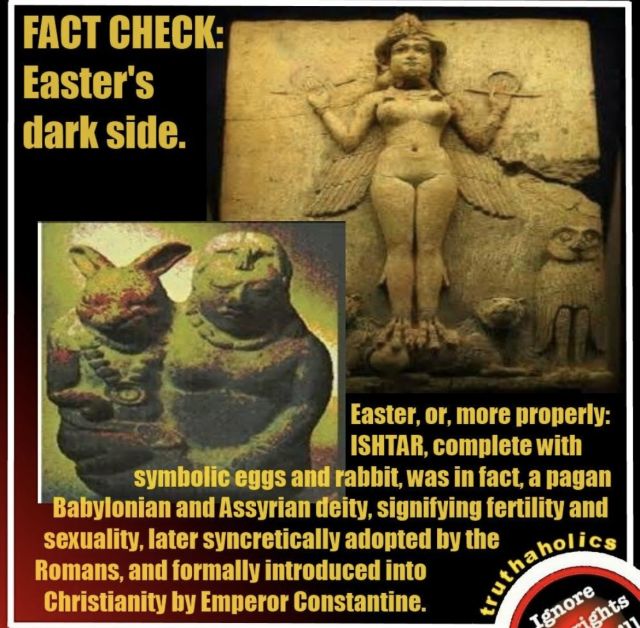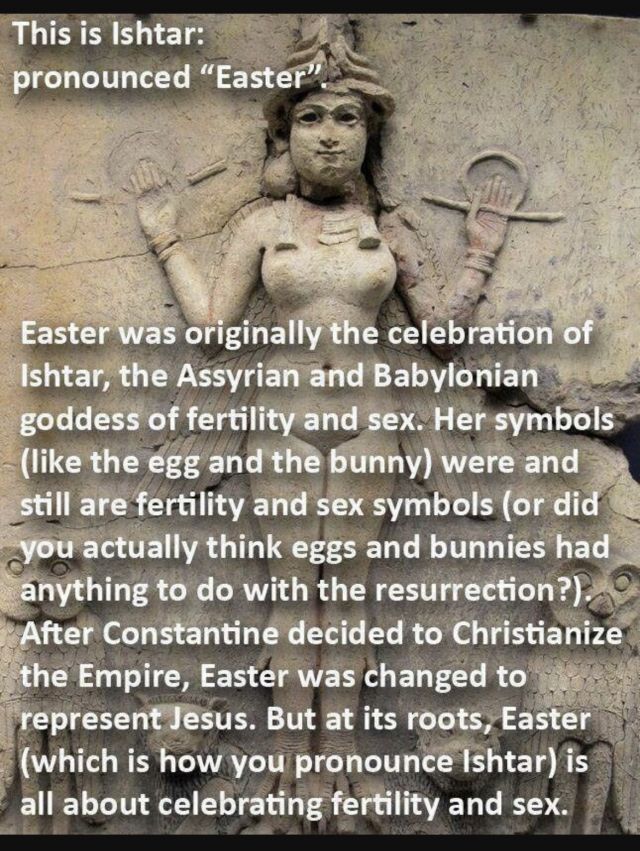Bideon declares Easter Trans Day celebrating God Of Ishtar Whore if Babylon
Biden saying that transgender people are “made in the image of God” and that their parents should affirm their gender identity. Jack Hibbs Easter Trans Dat God Ishar 2024 TRANSGENDER DAY OF VISIBILITY” Ishtar And Easter Connection: Investigating The ancient Mesopotamian goddess Ishtar is known for her many connections to Easter. Some believe that the Easter bunny is actually an incarnation of Ishtar, and that the Easter egg hunt is a continuation of her ancient fertility festival.

While there is no concrete evidence linking these traditions, it is interesting to explore the potential links between them. Hop over here to discover more. Definition of Ishtar and Easter There is much debate surrounding the origins of Easter, with some believing it to be a pagan holiday that pre-dates Christianity, while others claim that it is a Christian holiday that was adapted from an earlier pagan holiday.

However, there is one tradition that seems to be universally accepted as being related to both Easter and Ishtar, and that is the use of eggs as symbols of fertility. EASTER BIBLICAL EASTER ORIGINATES FROM THE BABYLONIAN FESTIVAL “ISHTAR”, THE GODDESS OF FERTILITY. IT WAS LATER CHANGED TO EASTER AND MASKED AS A CHRISTIAN HOLIDAY BUT AT ITS ROOTS, IT IS STILL A CELEBRATION OF A PAGAN GOD. Ishtar was an ancient Mesopotamian goddess of war, fertility, and sex. She is featured in the Epic of Gilgamesh, and the “Ishtar Gate” was part of Nebuchadnezzar’s Babylon. Her worship involved animal sacrifices; objects made of her sacred stone, lapis lazuli; and temple prostitution. Some people claim there exists a connection between Ishtar and Easter. A popular meme has been circulating the internet making that very claim. Superimposed over an image of Ishtar are these words: “This is Ishtar: pronounced ‘Easter.’ Easter was originally the celebration of Ishtar, the Assyrian and Babylonian goddess of fertility and sex. Her symbols (like the egg and the bunny) were and still are fertility and sex symbols (or did you actually think eggs and bunnies had anything to do with resurrection?). After Constantine decided to Christianize the Empire, Easter was changed to represent Jesus. But at its roots, Easter (which is how you pronounce Ishtar) is all about celebrating fertility and sex.” However, there is absolutely no conclusive connection between the pagan goddess Ishtar and the Christian celebration of Easter. Any theory that Easter is named after Ishtar is pure speculation. There is also no proof that Ishtar was ever associated with eggs or rabbits as symbols. In fact, Ishtar’s sacred animal seems to have been the lion. There are several theories concerning the origin of the word Easter that are more credible than the Ishtar theory. One is that Easter got its name from Eostre, an eighth-century Germanic goddess who (it is assumed) was celebrated around the time of Passover every year. But even this theory has major problems, since there is no real evidence that anyone ever worshiped a goddess named Eostre—we have no shrines dedicated to Eostre, no altars of hers, and no ancient documents mentioning her. Others contend that the word Easter ultimately derives from the Latin phrase in albis, related to alba (“dawn” or “daybreak” in Spanish and Italian). In Old High German, in albisbecame eostarum, which eventually became Ostern in modern German and Easter in English. The French word for “Easter” is Pâcques, based on the Latin and Greek Pascha, meaning “Passover.” Even if it could be proved that the word Easter is etymologically related to the name of a pagan goddess such as Ishtar or Eostre, it would not change what the holiday Easter means to us. (The word Wednesday comes from Woden’s Day in honor of the Norse god Woden or Odin—but we don’t usually fret about the word’s pagan origin.) Regardless of where the name Easter came from, Easter itself is the celebration of the resurrection of Jesus Christ. The resurrection of Jesus is a critical doctrine of the Christian faith stating definitively that Jesus conquered death and the grave and proved to be the world’s Savior from sin and death. “Whoever believes in Him shall not perish, but have eternal life” (John 3:16). The Significance of the Inanna/Ishtar Myths in Revelation 17 The symbol of Babylon has been interpreted with a common worldview in mind, the Great Mother concept. Although this concept comes from Neolithic times, its written sources appeared in Sumerian literature. This article considers some Sumerian myths of the goddess Inanna/Ishtar in the evaluation of Revelation 17. In the comparison of Inanna/Ishtar myths with Revelation 17, the analysis demonstrates that perhaps John echoes the Great Mother concept and some Inanna/Ishtar characteristics ironically. John presents the mistaken belief that the religiopolitical union would bring peace and prosperity to the nation and, unlike those ancient myths, the beast/kings will resurrect to die forever.
Anyone can join.
Anyone can contribute.
Anyone can become informed about their world.
"United We Stand" Click Here To Create Your Personal Citizen Journalist Account Today, Be Sure To Invite Your Friends.
Before It’s News® is a community of individuals who report on what’s going on around them, from all around the world. Anyone can join. Anyone can contribute. Anyone can become informed about their world. "United We Stand" Click Here To Create Your Personal Citizen Journalist Account Today, Be Sure To Invite Your Friends.
LION'S MANE PRODUCT
Try Our Lion’s Mane WHOLE MIND Nootropic Blend 60 Capsules
Mushrooms are having a moment. One fabulous fungus in particular, lion’s mane, may help improve memory, depression and anxiety symptoms. They are also an excellent source of nutrients that show promise as a therapy for dementia, and other neurodegenerative diseases. If you’re living with anxiety or depression, you may be curious about all the therapy options out there — including the natural ones.Our Lion’s Mane WHOLE MIND Nootropic Blend has been formulated to utilize the potency of Lion’s mane but also include the benefits of four other Highly Beneficial Mushrooms. Synergistically, they work together to Build your health through improving cognitive function and immunity regardless of your age. Our Nootropic not only improves your Cognitive Function and Activates your Immune System, but it benefits growth of Essential Gut Flora, further enhancing your Vitality.
Our Formula includes: Lion’s Mane Mushrooms which Increase Brain Power through nerve growth, lessen anxiety, reduce depression, and improve concentration. Its an excellent adaptogen, promotes sleep and improves immunity. Shiitake Mushrooms which Fight cancer cells and infectious disease, boost the immune system, promotes brain function, and serves as a source of B vitamins. Maitake Mushrooms which regulate blood sugar levels of diabetics, reduce hypertension and boosts the immune system. Reishi Mushrooms which Fight inflammation, liver disease, fatigue, tumor growth and cancer. They Improve skin disorders and soothes digestive problems, stomach ulcers and leaky gut syndrome. Chaga Mushrooms which have anti-aging effects, boost immune function, improve stamina and athletic performance, even act as a natural aphrodisiac, fighting diabetes and improving liver function. Try Our Lion’s Mane WHOLE MIND Nootropic Blend 60 Capsules Today. Be 100% Satisfied or Receive a Full Money Back Guarantee. Order Yours Today by Following This Link.








It wasn’t “changed to celebrate Jesus”. Easter is when Christ’s very REAL resurrection took place, and it’s the DATE IT OCURRED. The fact that pagan holidays are “worked in” has to do with Christian nations assimilating them into their rule, not the other way around